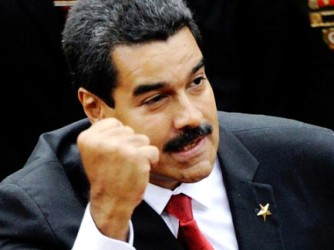Eager to divert attention from a world-record inflation rate, massive food shortages and other self-inflicted economic problems that could lead to an opposition victory in the Dec 6 legislative elections, Venezuelan President Nicolás Maduro is pulling a trick of last resort for embattled demagogues: reviving a dormant territorial controversy to stir nationalist passions.
It seems too crass, too obvious. But Maduro, whose popularity has plummeted to about 20 per cent, seems to have concluded that resurrecting an old border controversy with neighbouring Guyana and, more importantly, a border conflict Colombia, will change the conversation in Venezuela away from the shortages of meat, milk and coffee, or from the sky-high inflation rate, which according to a new Bank of America report is likely to reach 172 per cent this year.
 Maduro’s previous political excuses, including blaming Venezuela’s economic disaster on an alleged “economic war” by US-backed oligarchs, are no longer working. After 15 years in power, during which much of Venezuela’s private sector has been decimated and corrupt pseudo-revolutionaries have become immensely rich, it’s becoming increasingly harder for Venezuela’s radical leftist regime to blame others for the country’s collapse.
Maduro’s previous political excuses, including blaming Venezuela’s economic disaster on an alleged “economic war” by US-backed oligarchs, are no longer working. After 15 years in power, during which much of Venezuela’s private sector has been decimated and corrupt pseudo-revolutionaries have become immensely rich, it’s becoming increasingly harder for Venezuela’s radical leftist regime to blame others for the country’s collapse.
Earlier this week, Maduro announced that he will call for a “civic-military union” to confront an “international manoeuvre from the right to provoke Venezuela with border problems.” The alleged “manoeuvre” was led by ExxonMobil and Guyana, which announced a significant offshore oil find in a bid called by Guyana in ‘disputed’ waters in the Caribbean, Maduro said.
Shortly after ExxonMobil’s announcement, Venezuela issued a decree on May 26 claiming the Caribbean waters where the oil discovery took place as its own. But Maduro’s decree went a step further: it announced four “operational defence areas” to defend Venezuela’s sovereignty in several disputed areas, including an area that is claimed by both Venezuela and Colombia.
That, in turn, led to a formal protest by Colombia, whose president, Juan Manuel Santos, said that Maduro’s decree amounted to a “violation of Colombia’s rights,” and demanded that Venezuela immediately “rectify the content” of its decree.

Many political strategists speculate that Maduro might find an eager sparring partner in Santos. Colombia’s president, who made his mark by improving relations with Venezuela during his first term, might profit politically from escalating border tensions with Venezuela ahead of Colombia’s October elections for governors and mayors, they say.
“Santos is politically weak right now, and could benefit from playing the nationalist card,” says Mauricio de Vengochea, a Miami-based political consultant who advises politicians in Colombia and Venezuela. “We can’t forget that there is a big anti-Maduro sentiment in Colombia.”
In addition, Santos no longer needs Venezuela as much as in the past to reach a peace agreement with Colombia’s FARC guerrillas. Unlike late Venezuelan President Hugo Chávez, Maduro doesn’t have as much leverage with the guerrillas, which allows Santos to take some distance from Venezuela without endangering his peace negotiations with the FARC, some argue.
A border skirmish between Venezuela and Colombia in coming months, most likely started by Venezuela, is not unthinkable, political insiders in both countries tell me.
Less than 30 years ago, on Aug 9, 1987, the two countries almost went to war when the Venezuelan frigate Libertad confronted a Colombian navy ship over disputed waters. Maduro’s May 26 decree that included disputed waters under Venezuela’s “operational defence areas” amounted to a similar Venezuelan provocation, many Colombians say.
My opinion: Maduro’s electoral strategy to win the Dec 6 legislative elections — in addition to a dubious election process in which he will monopolize television time, keep opposition leaders in jail under phony charges, and prohibit European Union and Organization of American States observers from watching the vote — will be to escalate border tensions with Guyana and Colombia.
Venezuela’s neighbours and Washington should not allow one single life to be lost over these artificially resurrected border conflicts. When Brazilian President Dilma Rousseff visits Washington next week, President Barack Obama should cite the danger of a senseless border war in her neighbourhood as one of his major arguments to convince her to step up Latin American pressure on Maduro to stop behaving like a tropical, 19th-century tyrant.
Inflating a dormant border conflict to stir nationalist passions is the oldest trick in the demagogues’ manual. But it has worked before, and Maduro is showing that, now that his blame game against the “US-backed oligarchy” has lost steam, he will use it as his main strategy to retain absolute power.
© The Miami Herald, 2015. Distributed by Tribune Media Services.





